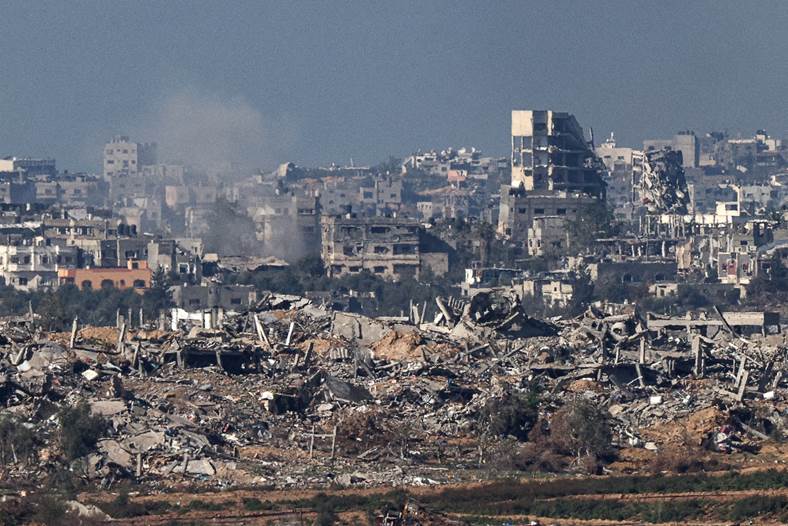
More than 18 per cent of total infrastructure across the Gaza Strip has been destroyed according to UN reports - AFP via Getty
‘The Damage Is Done’: Experts Warn Gaza Has Reached Point of No Return
By Maira Butt
Houses, medical facilities, schools, shops, water, electricity and fuel.
Basic building blocks of everyday life that have been obliterated in many areas of the Gaza Strip as the Israeli bombardment following Hamas’ deadly 7 October attacks stretches into its third month.
With US president Joe Biden this week pointedly calling out the Israel military’s ‘indiscriminate bombing, many Palestinians feel that whatever happens next may be too little too late.
“The damage is done,” says Palestinian lawyer Diana Buttu, former legal adviser to the Palestinian Liberation Organization (PLO). “ Gaza is now beyond repair. The physical damage cannot be fixed.”
Ms Buttu, who worked with the PLO and Israeli governments during the final Israeli-Palestinian peace talks between 2000 and 2004, believes the conflict has reached a point of no return.
“Let’s assume the bombing stops tomorrow,” she said. “Most homes are uninhabitable – where do you send all these people? How do you provide for them? Where are the shops, the schools, the universities, the hospitals?
“It will take years to even get to a place resembling a life, where do people go in the meantime?”
The United Nations said on Tuesday it had used its satellite analysis agency UNOSAT to determine that 18 per cent of Gaza’s infrastructure had been destroyed since the October attacks.
This includes at least 60 per cent of all housing units according to the UN’s Office for the Coordination of Humanitarian Affairs and 50 per cent of all infrastructure in the north of the strip.
This infrastructure includes homes, hospitals, schools, universities and mosques.
More than 77 per cent of Gazan hospitals are now non-operational according to the World Health Organization and nine out of 10 Palestinians do not eat every day according to the World Food Program. More than 85 per cent of the population, some 1.9 million people, are believed to have been displaced.
And the breakdown of civilian infrastructure is bringing with it an impending breakdown of Palestinian society, it has been warned.
“We are witnessing the beginning of the breakdown of civil order,” an UNRWA spokesperson told The Independent . “People are extremely anxious, extremely hungry, extremely scared. People have been going into one of our main food distribution shelters in Khan Yunis and fending for themselves.
“That speaks volumes about their level of anxiety but also that it isn’t possible anymore to conduct a proper, organized humanitarian operation. People are too scared, upset, angry and distressed – everyone is in survival mode.”
The Israeli Defense Forces have been adamant its military objectives are to eradicate Hamas, arguing the group uses Palestinian civilians as human shields in hospitals, homes and schools and that it is essential to ensure the national security of Israel.
Mark Regev, a senior adviser to Israeli Prime Minister Benjamin Netanyahu, said on Thursday: “The idea that Israel is somehow indiscriminately carpet bombing Gaza, this is simply just not true.”
A spokesperson for Israeli human rights organization B’Tselem said: “Everything we’ve seen in the last two months, we haven’t seen before.
“The scale and intensity of everything in Gaza and the West Bank as well as the intensity of Hamas crimes on October 7. Some of our Jewish and Israeli staff lost loved ones. A lot of people across the region are handling trauma and mourning right now.
“All of this is worse than we’ve ever seen, there’s no question about it. But we can’t go back to where we were before, which was an apartheid state.”
Human Rights Watch, Amnesty International and various UN officials have concluded Israel as committing apartheid in their investigations, a claim that Israel vehemently denies and has called antisemitic.
But the question of what Palestinians will come back to remains.
Juliette Touma, a Director at the United Nations Relief and Works Agency told The Independent that Gaza is “becoming unlivable”.
She said: “This is the most challenging moment in the history of the UN for a number of medical reasons, but for UNRWA it’s the most challenging moment in the 75-year history of the agency. People in Gaza have reached their darkest hour.
“It’s not even comparable to any of the conflicts that Gaza has had. This is no place for children, no place for human beings. They are living in a hellhole.” - The Independent

